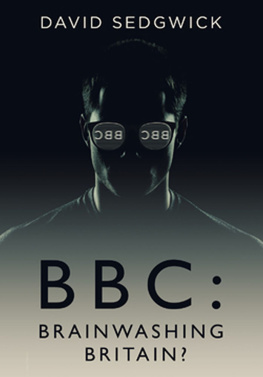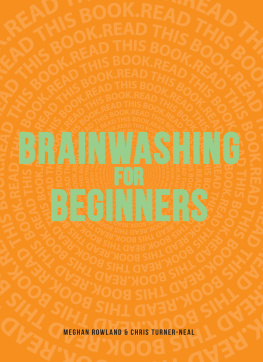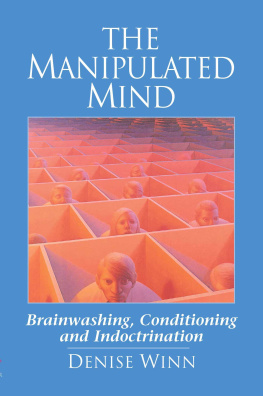All rights reserved.
Acknowledgements
Nineteen Eighty-Four by George Orwell (Copyright George Orwell, 1949) Reprinted by permission of Bill Hamilton as the Literary Executor of the Estate of the Late Sonia Brownell Orwell. Robin Aitken, 2007, Can We Trust the BBC? Reprinted by permission of Continuum Publishing, an imprint of Bloomsbury Publishing Plc. With thanks to OUP for permission to quote from Brainwashing: The Science of Thought Control. Thanks to CPS for permission to quote from Confessions of a Reformed BBC Producer. Thanks to Biteback for permission to quote from When One Door Closes and Getting Out Alive: News, Sport and Politics at the BBC.
Thanks to the many people who have helped with the production of this book including friends and family as well as the people of Malm, Sweden all of whom generously donated their time and patience.
Copyright material used in this book without specific authorisation is done so under fair dealing and fair use principles for purposes of criticism, comment, news reporting, teaching, scholarship, education and research.
There was one other thing I did feel
uncomfortable about when I joined
[the BBC], and still do. Ive been on two
courses and each time there seemed to be
an attempt being made by somebody to
do a job of brainwashing.
Tom Burns, The BBC:
Public Institution and Private World
For more than sixty years the BBC had
Played a leading role in brainwashing
the middle classes. Its regime of
moderation and good sense had been
an elaborate cover behind which it
Imposed an ideology of passivity and
self-restraint. The BBC had defined the
national culture, a swindle in which the
middle classes had colluded, assuming
that moderation and civic responsibility
were in their own interest.
J.G. Ballard,
Millennium People
What is our [BBC] job? Is it our job
to report the news, or is it our job
to brainwash the population?
Robin Aitken,
Can we Trust the BBC?
Introduction
When devils will the blackest sins put on
They do suggest at first with heavenly shows
Othello, William Shakespeare
Anyone spending time on social media these days cant but help notice a growing mood of scepticism towards what is commonly known as the mainstream media, or MSM for short. The little people are frustrated. They feel cheated somehow, duped, disregarded, reviled even. The worms appear to be turning. Before the birth of the Internet the plebs took everything they heard from the MSM as the gospel truth - they had little choice. And then along came the Internet Facebook, Twitter et al.
Things would never be the same again.
Britains own lynchpin of all things mainstream, the BBC has found itself under scrutiny like never before. Why should I as a licence payer, asked a social media user of BBC News one day, have your biased reporting shoved down my throat? Strong stuff: biased reporting is bad enough, but to be forcibly fed this stuff? Theres plenty more where that came from: As for the BBC, notes a Disqus user, I can't bring myself to bother watching anything they broadcast now - every single thing they produce is an exercise in social engineering no matter the topic. And then theres this: Keep it up BBC. Watching you dig your own grave makes better viewing than 99% of the programmes you make. Another Disqus user summarises the situation thus:
I never hardly watch anything from the BBC
these days....its all total drivel. Even the
'comedy' is rubbish now.....its just not funny.
And the News is always left- wing propaganda!
And documentaries are usually ' historically
inaccurate' being always MARXIST inspired
revisionist drivel. Their 'costume dramas are
merely an exercise in historical revisionism to
promote the multi-cult Marxist dystopia.
Volumes upon volumes of books could be filled with comments such as these. Multi-cult Marxist dystopia .. ? Clearly, something is not quite right here, and has not been since at least 2016 and beyond. The election of Donald Trump as US president and the UKs vote to leave the EU has, it would appear, heralded in a new age of consciousness in a hitherto docile public:
@Anon
Would we have known just how infested the
BBC are with left wing propaganda? Brexit
has been the awakening for many, including
me.
The more it attacks the US president and the more it attempts to undermine Brexit, suspicions that have been hitherto vague began to crystallise: how does the BBCs claim to be an impartial, politically neutral broadcaster square with its continuous, at time petty and vindictive attacks on the democratically-elected president of the United States? If the broadcaster is indeed a national voice representative of the country as a whole, why has it been doing everything in its power to undermine the outcome of the 2016 EU Referendum in which some 17.4 million citizens expressed a desire to leave the union?
@Anon
Brexit has exposed the BBC for what it is. Its
time is up.
The mask appears to be slipping, the heavenly show not quite so alluring, the proclamations not quite so convincing.
And so social media echoes to the sound of BBC bashing: Brussels Broadcasting Corporation, British Bullshitting Corporation, Bolshevik Broadcasting Corporation , not forgetting our own particular favourite (and inspiration for this book) British Brainwashing Corporation . These are just some of the more printable interpretations of the BBC acronym seen on the net. While the broadcaster has always had its critics, this is unchartered territory. Antipathy towards the corporation is visceral. Im getting really fed up with the complaints and criticisms being directed at BBC News at the moment, writes the BBCs John Simpson. Not so much from our usual critics... No its middle-of-the-roaders who are doing the complaining now. But it never used to be this way.
In the not too distant past Britains national broadcaster basked in the adulation from a tame, almost nave public. Everybody, or so it seemed, depended on the BBC. Some even adored it. In reference to its sensible, pragmatic approach to all things Britains post-war media playfully dubbed the corporation Auntie. The name stuck. Through war and peace, Auntie remained a calm, authoritative voice even though some had started to feel uneasy with its claim to be an independent organisation, free of government interference. Reservations aside, the BBC was undoubtedly the voice of the people. By the 1950s it had carved out a niche in the British psyche so deep, so secure, that the adoption of Auntie merely sealed its unique status within Britain and beyond. The question of trust would never have even occurred. Fast forward to 2018.
The calls to scrap the television licence fee grow ever louder. Accusations of bias and misconduct abound. From stories littered with inaccuracies and glaring omissions, hardly a day goes by without Britains national broadcaster finding itself up to its eyeballs in yet more controversy. We managed to laugh our way through every crisis and you get a lot at the BBC, recalls former Director General Greg Dyke. As we shall see in this book, the reasons for this situation run deep, much deeper than mere incompetency. Lessons can always be learnt from mistakes which are genuine. Deliberate errors are another matter altogether.
The modern BBC is an entirely different animal than it was back in the 1950s when Auntie seemed to capture its essence so deftly. The modern organisation is in fact barely recognisable to its 1970s or even 1980s incarnations. Something has changed is changing. The purpose of this book is to investigate the reasons that underpin this dramatic transformation. With its enthusiasm for all things liberal and progressive, to the ordinary man and woman in the street the national broadcaster arguably feels ever more remote, ever more detached from their own reality than at any time in the corporations near 100-year history.








